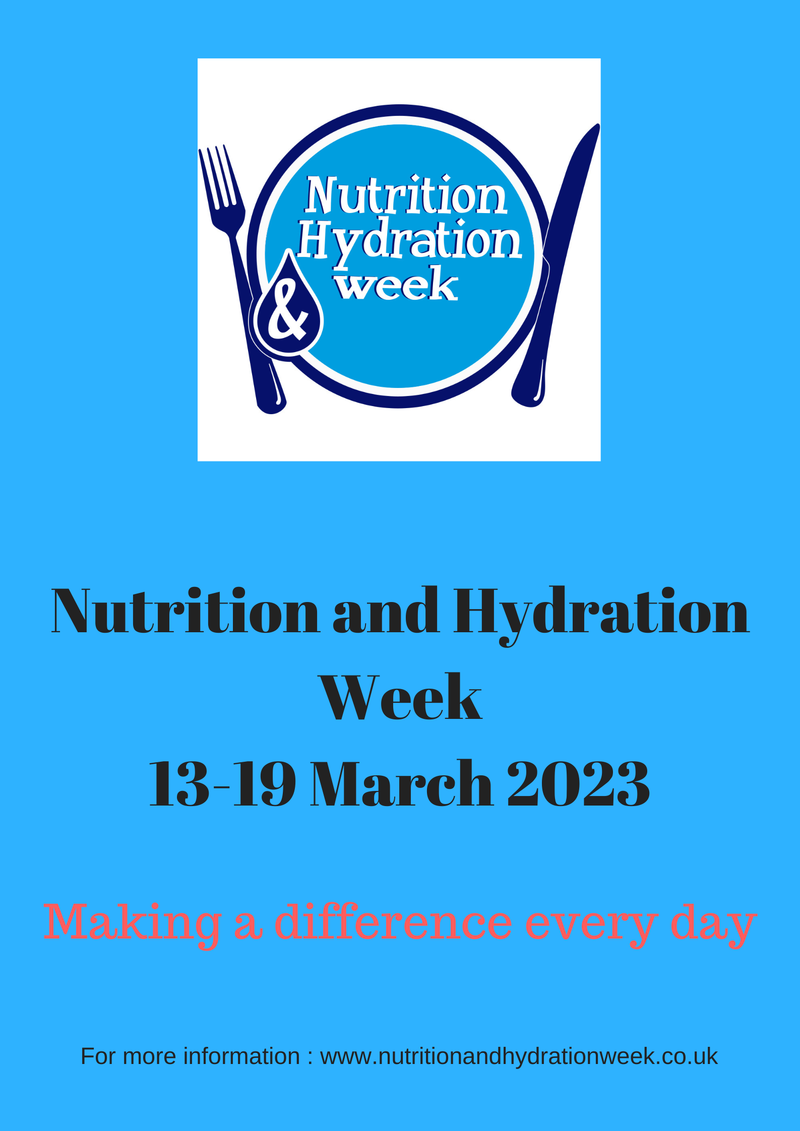
Posted on: March 15, 2023
BSNA welcomes Nutrition and Hydration Week 2023 – How to reinforce, focus and energise around good nutritional care
BSNA is delighted to welcome this year’s Nutrition and Hydration Week – the annual opportunity to promote understanding of the importance of nutrition and hydration in health and social care.
Access to nutritional care is a human right intrinsically linked to the right to a standard of living adequate for the health and well-being of an individual and their family, including food and medical care, as set out in Article 25 of the Universal Declaration of Human Rights.[1]
Although there is growing evidence that effective nutritional care helps to minimise and manage malnutrition and improve disease outcomes, it is still the case that many patients across the globe do not have access to high quality nutritional care. This includes ensuring there is effective screening for malnutrition, diagnosis and assessment of disease-related malnutrition and food, and evidence based medical nutrition therapy for all who need it.
In the UK disease related malnutrition (DRM) is still often unrecognised and untreated across healthcare settings leading to poorer outcomes, greater healthcare use and greater costs.[2] In contrast, expenditure on interventions to manage DRM represents a very small proportion of the overall cost (<2.5%)2 as well as being relatively easy to implement across care settings.
With an estimated three million people either malnourished or at risk of malnutrition in the UK, malnutrition is a significant public health issue. The NICE Clinical Guideline on nutrition support for adults (NICE CG32) recognises that malnutrition is both a cause and an effect of ill health and that ‘good nutrition support services’ are crucial in treating a wide range of other conditions[3].
As the proportion of older people in the UK population continues to grow and the prevalence of chronic long-term conditions also grows, good nutritional care including improved screening for malnutrition should be prioritised as a key element in managing the risk of malnutrition and maintaining optimum health for all.
In 2015 NHS England published its version of the Council of Europe ’10 key characteristics of good nutrition and hydration care’, which were made a requirement to meet the Hospital Food Standards SC19 in the NHS Contract for hospitals.[4]
The 10 key characteristics are:
- Screen all patients and service-users to identify malnourishment or risk of malnourishment and ensure actions are progressed and monitored.
- Together with each patient or service user, create a personal care/support plan enabling them to have choice and control over their own nutritional care and fluid needs.
- Care providers should include specific guidance on food and beverage services and other nutritional & hydration care in their service delivery and accountability arrangements.
- People using care services are involved in the planning and monitoring arrangements for food service and drinks provision.
- Food and drinks should be provided alone or with assistance in an environment conducive to patients being able to consume their food (Protected Mealtimes).
- All health care professionals and volunteers receive regular raining to ensure they have the skills, qualifications and competencies needed to meet the nutritional and fluid requirements of people using their services.
- Facilities and services providing nutrition and hydration are designed to be flexible and centred on the needs of the people using them, 24 hours a day, every day.
- All care providers to have a nutrition and hydration policy centred on the needs of users, and is performance managed in line with local governance, national standards and regulatory frameworks.
- Food, drinks and other nutritional care are delivered safely.
- Care providers should take a multi-disciplinary approach to nutrition and hydrational care, valuing the contribution of all staff, people using the service, carers and volunteers working in partnership.
As integrated care systems build new ways of working and integrated pathways for patient care, these characteristics can be used to support the effective implementation of NICE Guideline CG32 across all settings.
BSNA fully supports Nutrition and Hydration Week in reinforcing the importance of good nutritional care across health and care services, giving focus to how integrated care systems can prioritise nutrition and hydration for patients, and energising the sharing of good practice to tackle malnutrition, whether patients are in hospital, a care home or in their own homes.
[1] Universal Declaration of Human Rights. United Nations Department of Public Information. Accessed online: www.ohchr.org/en/human-rights/... (Sep 2022).
[2] 6. Stratton R, Smith T, Gabe S. Managing malnutrition to improve lives and save money. BAPEN; 2018. Available online https://www.bapen.org.uk/pdfs/... [Accessed 01.02.23].
[3] National Institute for Health and Clinical Excellence (2006). Nutrition support for adults: oral nutrition support, enteral tube feeding and parenteral nutrition (Clinical guideline [CG32]). Updated 17 August 2017. Available from: https://www.nice.org.uk/guidan... [Accessed 12 July 2022]
[4] NHS England National standards for healthcare food and drink. Available online https://www.england.nhs.uk/lon... [Accessed 14.3.23]